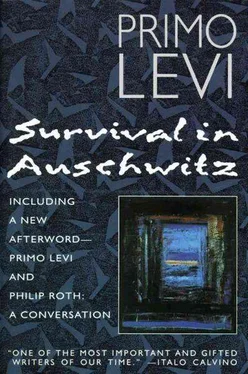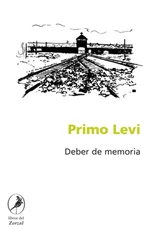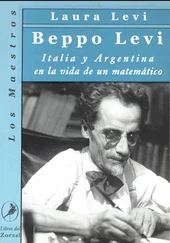We hurried to the kitchens as fast as we could; but the potatoes were almost finished. We filled two sacks and left them in Arthur’s keeping. Among the ruins of the Prominenzblock Charles and I finally found what we were searching for: a heavy cast-iron stove, with the flue still usable. Charles hurried over with a wheelbarrow and we loaded it on; he then left me with the task of carrying it to the hut and ran back to the sacks. There he found Arthur unconscious from the cold. Charles picked up both sacks and carried them to safety, then he took care of his friend.
Meanwhile, staggering with difficulty, I was trying to manoeuvre the heavy wheelbarrow as best as possible. There was the roar of an engine and an SS man entered the camp on a motorcycle. As always when I saw their hard faces I froze from terror and hatred. It was too late to disappear and I did not want to abandon the stove. The rules of the Lager stated that one must stand at attention with head uncovered. I had no hat and was encumbered by the blanket. I moved a few steps away from the wheelbarrow and made a sort of awkward bow. The German moved on without seeing me, turned behind a hut and left. Only later did I realize the danger I had run.
I finally reached the entrance of the hut and unloaded the stove into Charles’s hands. I was completely breathless from the effort, large black spots danced before my eyes.
It was essential to get it working. We all three had our hands paralysed while the icy metal stuck to the skin of our fingers, but it was vitally urgent to set it up to warm ourselves and to boil the potatoes. We had found wood and coal as well as embers from the burnt huts.
When the broken window was repaired and the stove began to spread its heat, something seemed to relax in everyone, and at that moment Towarowski (a Franco-Pole of twenty-three, typhus) proposed to the others that each of them offer a slice of bread to us three who had been working. And so it was agreed.
Only a day before a similar event would have been inconceivable. The law of the Lager said: ‘eat your own bread, and if you can, that of your neighbour’, and left no room for gratitude. It really meant that the Lager was dead.
It was the first human gesture that occurred among us. I believe that that moment can be dated as the beginning of the change by which we who had not died slowly changed from Häftlinge to men again.
Arthur recovered quite well, but from then on always avoided exposing himself to the cold; he undertook the upkeep of the stove, the cooking of the potatoes, the cleaning of the room and the helping of the patients. Charles and I shared the various tasks outside. There was still an hour of light: an expedition yielded us a pint of spirits and a tin of yeast, thrown in the snow by someone; we made a distribution of potatoes and one spoonful of yeast per person. I thought vaguely that it might help against lack of vitamins.
Darkness fell; in the whole camp ours was the only room with a stove, of which we were very proud. Many invalids from other wards crowded around the door, but Charles’s imposing stature held them back. Nobody, neither us nor them, thought that the inevitable promiscuity with our patients made it extremely dangerous to stay in our room, and to fall ill of diphtheria in those conditions was more surely fatal than jumping off a fourth floor.
I myself was aware of it, but I did not dwell long on the idea: for too long I had been accustomed to think of death by illness as a possible event, and in that case unavoidable, and anyhow beyond any possible intervention on our part. And it did not even pass through my mind that I could have gone to another room in another hut with less danger of infection. The stove, our creation, was here, and spread a wonderful warmth; I had my bed here; and by now a tie united us, the eleven patients of the Infektionsabteilung.
Very occasionally we heard the thundering of artillery, both near and far, and at intervals the crackling of automatic rifles. In the darkness, lighted only by the glow of the embers, Arthur and I sat smoking cigarettes made of herbs found in the kitchen, and spoke of many things, both past and future. In the middle of this endless plain, frozen and full of war, in the small dark room swarming with germs, we felt at peace with ourselves and with the world. We were broken by tiredness, but we seemed to have finally accomplished something useful — perhaps like God after the first day of creation.
20 January. The dawn came and it was my turn to light the stove. Besides a general feeling of weakness, the aching of my joints reminded me all the time that my scarlet fever was far from over. The thought of having to plunge into the freezing air to find a light in the other huts made me shudder with disgust I remembered my flints: I sprinkled a piece of paper with spirits, and patiently scraped a small pile of black dust on top of it and then scraped the flint more vigorously with my knife. And finally, after a few sparks, the small pile caught fire and the small bluish flame of alcohol rose from the paper.
Arthur climbed down enthusiastically from his bed and heated three potatoes per person from those boiled the day before; after which, Charles and I, starved and shivering violently, left again to explore the decaying camp.
We had enough food (that is, potatoes) for two days only; as for water, we were forced to melt the snow, an awkward operation in the absence of large pots, which yielded a blackish, muddy liquid which had to be filtered.
The camp was silent. Other starving spectres like ourselves wandered around searching, unshaven, with hollow eyes, greyish skeleton bones in rags. Shaky on their legs, they entered and left the empty huts carrying the most varied of objects: axes, buckets, ladles, nails; anything might be of use, and those looking furthest ahead were already thinking of profitable commerce with the Poles of the surrounding countryside.
In the kitchen we found two of them squabbling over the last handfuls of putrid potatoes. They had seized each other by their rags, and were fighting with curiously slow and uncertain movements, cursing in Yiddish between their frozen lips.
In the courtyard of the storehouse there were two large piles of cabbages and turnips (those large, insipid turnips, the basis of our diet). They were so frozen that they could only be separated with a pickaxe. Charles and I took turns, using all our energy at each stroke, and we carried out about 100 pounds. There was still more: Charles discovered a packet of salt and (‘Une fameuse trouvaille!’) a can of water of perhaps twelve gallons, frozen in a block.
We loaded everything on to a small cart (formerly used to distribute the rations for the huts; there were a great number of them abandoned everywhere), and we turned back, toiling over the snow.
We contented ourselves that day with boiled potatoes again and slices of turnips roasted on the stove, but Arthur promised important innovations for the following day.
In the afternoon I went to the ex-surgery, searching for anything that might prove of use. I had been preceded: everything had been upset by inexpert looters. Not a bottle intact, the floor covered by a layer of rags, excrement and soiled bandages. A naked, contorted corpse. But there was something that had escaped my predecessors: a battery from a lorry. I touched the poles with a knife — a small spark. It was charged.
That evening we had light in our room.
Sitting in bed, I could see a large stretch of the road through the window. For the past three days the Wehrmacht in flight passed by in waves. Armoured cars, Tiger tanks camouflaged in white, Germans on horseback, Germans on bicycle, Germans on foot, armed and unarmed. During the night, long before the tanks came into sight, one could hear the grinding of their tracks.
Читать дальше












